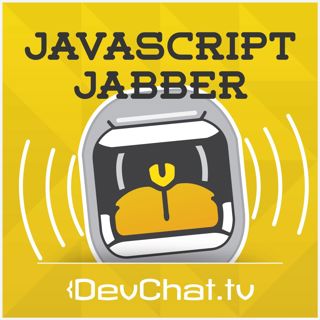
Node.js Performance, Kubernetes, and Why “Fast” Isn’t Always Fast - JSJ 702
In this episode of JavaScript Jabber, I sat down with Matteo Collina—chair of the Node.js project and founder of Platformatic—for a deep, no-fluff conversation about Node.js performance in the real wo...
10 Feb 1h 20min

TanStack Start, AI, and the Future of Frontend Architecture - JSJ 701
It’s great to be back behind the mic! In this episode of JavaScript Jabber, I’m joined by Dan Shapir and our guest Jack Harrington from Netlify and TanStack for a wide-ranging, high-energy conversatio...
30 Jan 1h 12min

What’s New in React 19.2: Compiler, Activity, and the Future of Async React - JSJ 700
In this episode of JavaScript Jabber, I sat down with Shruti Kapoor, independent content creator and longtime React educator, to dig into what’s actually new — and worth getting excited about — in Rea...
8 Jan 1h 15min

Can You Really Trust AI-Generated Code? - JSJ 699
AI is writing more of our code than ever before—but should we actually trust it? In this episode of JavaScript Jabber, I sat down with Itamar Friedman from Qodo (formerly Quoto) to dig into one of the...
24 Dec 202546min

The Real State of Tech Hiring: AI, Ghosting, and the Developer Drought - JSJ 698
In this episode of JavaScript Jabber, Steve Edwards and I kick things off by catching up on life — from winter weather and marathon training to health journeys, CrossFit, and some behind-the-scenes pe...
10 Dec 20251h 4min

Why Astro Is Winning Developers Over with Sagi Carmel - JSJ 697
In this episode, I sit down with developer and speaker Sagi Carmel to dive deep into Astro, why it’s gaining so much traction, and how it compares to frameworks like Next.js, Nuxt, Remix, and SvelteKi...
23 Nov 20251h 3min

The Truth About AI in Everyday JavaScript Development - JSJ 696
It feels great to finally be back on the mic after a stretch of travel, work, and general chaos, and in this episode we’re diving into a topic that’s been coming up more and more in everyday developer...
14 Nov 20251h 15min

Guarding the JavaScript Supply Chain: Preventing NPM Attacks with Feross Aboukhadijeh - JSJ 695
Hey everyone—it’s Steve Edwards here, and in this episode of JavaScript Jabber, I’m joined by returning guest Feross Aboukhadijeh, founder of Socket.dev, for a deep dive into the dark and fascinating ...
1 Nov 20251h






















